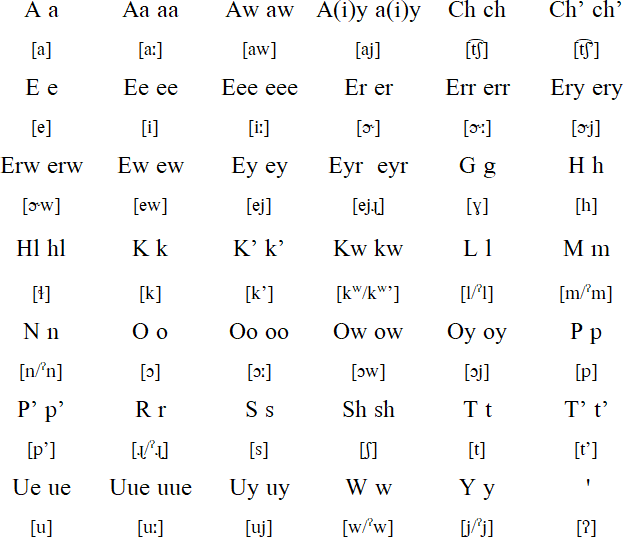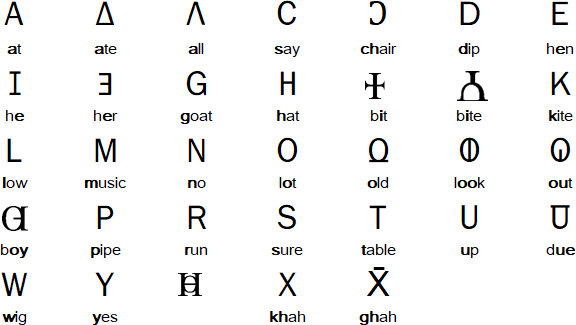Yurok is an Algic language that was spoken in Northern California, particularly in Del Norte County and Humboldt County on the far North Coast of California. The last known native speaker, Archie Thompson, died in 2013. Revitalization efforts started in 1996, when there were 20 native speakers left. They worked with linguists to document and revitalize the language. Since then, some 400 people have learnt at least some Yurok, including about 100 people who speak it an advanced or intermediate level.
The name Yurok comes from the Karuk word yúruk, which means 'downriver'. The Yurok call themselves Puliklah, which means 'downriver people'. Other names for the language include Chillula, Mita, Pekwan, Rikwa, Sugon, Weitspek, Weitspekan. It is related to Wiyot, which was also spoken in northern California.
Yurok is written with the Latin alphabet. The alphabet shown below is known as the New Yurok Alphabet, which has been in use since 2020. Before then, several spelling systems were used. In the 1970s and 1980s, ways to write Yurok, and other Native American languages of California, with Unifon were devised and promoted by Tom Parsons (1930-2018), the director of Humboldt State University's Community Development Center. A number of Yurok books in the Unifon alphabet were published. Yurok is currently taught in several elementary and high schools in Humboldt and Del Norte counties in northern California.


Download an alphabet chart for Yurok (Excel)
Noohl heekon Ko'omen 'o 'ok'w we'yon. 'O ge'm, Kowecho' nue lekwtemehl 'o yo', mee' mos skuye'n. Kwesee 'o ge'm, Kues 'elekw 'we-so'n mehl hegee', Kowecho' lekwtemehl? Chyue' nek kwelekw ko lekwtemehl. 'O lekwtemehl. Kwesee kue huuek 'o pkwechok'w. Kwesee 'o ro'op', 'o keme'y. So 'oolekw 'o ro'op' kue we'yon. 'O ge'm, Kowecho, yaa! mee' keech mos nego'leyo'm. Hee', Kowecho' lekwtemehl, tue' weeshtue' keech lekwtemehl kue huuek. Kwesee kue cheenomewes so hegok'w, kwesee tue' perwer'k'uek 'o sootok'w. Mocho kee yegoye'm, Kowecho' wek serrhlerper'm, cho' 'o nego'leyo'm, mee' 'eenee k'ee huuek kee pkwechok'w.
Long ago in Orleans there was a teenage girl. She (her grandmother) said, Don't go dig there, because it's not good. And she said, I wonder why they always say, Don't dig? I think I'll dig there. She dug there. And the child came out. And she ran, she went home. The girl ran in the house. She said, Don't, oh! because you didn't believe. She was told, Don't dig, but she dug the child (out). And the young man left, and he went far south on the coast. If they say to you, Don't do that, you'd better believe them, because this child will come out.
Source: https://linguistics.berkeley.edu/~yurok/text-details.php?style=default&text=GT4
Information about Yurok | Numbers
Information about the Yurok Language
http://en.wikipedia.org/wiki/Yurok_language
http://www.native-languages.org/yurok.htm
http://www.linguistics.berkeley.edu/~yurok/
https://www.yuroktribe.org/language-revitalization
https://en.wikipedia.org/wiki/Unifon#Unifon_for_Native_American_languages
Languages written with the Latin alphabet
Page last modified: 18.10.24
[top]
You can support this site by Buying Me A Coffee, and if you like what you see on this page, you can use the buttons below to share it with people you know.

If you like this site and find it useful, you can support it by making a donation via PayPal or Patreon, or by contributing in other ways. Omniglot is how I make my living.
Note: all links on this site to Amazon.com, Amazon.co.uk
and Amazon.fr
are affiliate links. This means I earn a commission if you click on any of them and buy something. So by clicking on these links you can help to support this site.
[top]